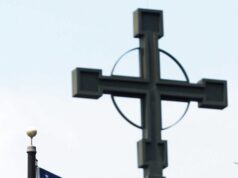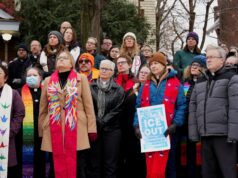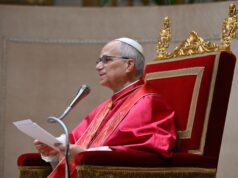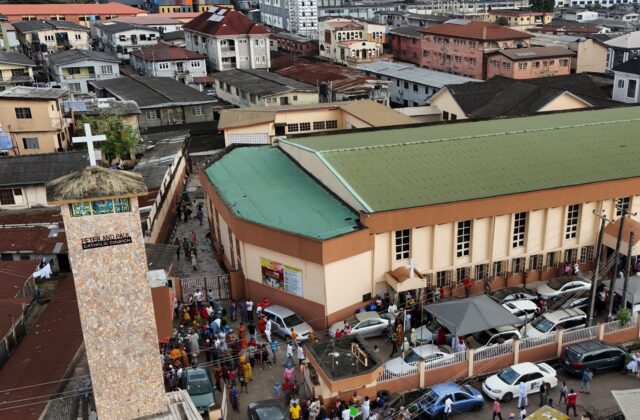
President Donald Trump said Oct. 31 he would place Nigeria on a religious freedom watch list in response to violence in that country perpetuated against predominantly Christian communities — and subsequently threatened military action if that country’s government didn’t “move fast” to respond.
Trump said he would designate Nigeria as a “country of particular concern,” a State Department designation for nations or entities that carry out systemic religious freedom violations.
In a post on his social media website Truth Social, Trump wrote, “Christianity is facing an existential threat in Nigeria.”
“Thousands of Christians are being killed. Radical Islamists are responsible for this mass slaughter,” he said.
Nigeria, which has a population of about 237 million people, is roughly split between Muslims and Christians. Violence against Christians has escalated in recent years from Islamic extremist groups such as Boko Haram; however, Muslim communities have also been gravely impacted by the violence. Disputes between farmers and herders have also led to violence and displacement.
“When Christians, or any such group, is slaughtered like is happening in Nigeria … something must be done!” Trump said.
Trump also said he would ask Reps. Riley Moore, R-W.Va., and Tom Cole, R-Okla., “to immediately look into this matter, and report back to me.”
Cole is chairman of the House Appropriations Committee, and Moore is a member. Both are among the lawmakers who have sought the designation.
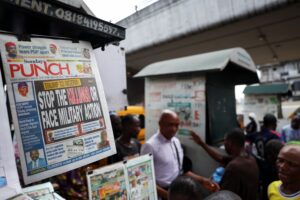
“The United States cannot stand by while such atrocities are happening in Nigeria, and numerous other Countries,” Trump said. “We stand ready, willing, and able to save our Great Christian population around the World!
In a subsequent post the following day, Trump threatened aid to Nigeria and possible military action.
“If the Nigerian Government continues to allow the killing of Christians, the U.S.A. will immediately stop all aid and assistance to Nigeria, and may very well go into that now disgraced country, ‘guns-a-blazing,’ to completely wipe out the Islamic Terrorists who are committing these horrible atrocities,” he said.
Using the moniker “Department of War” for the Department of Defense — a secondary, ceremonial title that he authorized by an executive order — Trump President Donald Trump
“If we attack, it will be fast, vicious, and sweet, just like the terrorist thugs attack our CHERISHED Christians! WARNING: THE NIGERIAN GOVERNMENT BETTER MOVE FAST!” he said.
Nigeria’s President Bola Ahmed Tinubu pushed back, writing on X, “Nigeria stands firmly as a democracy governed by constitutional guarantees of religious liberty.”
“Since 2023, our administration has maintained an open and active engagement with Christian and Muslim leaders alike and continues to address security challenges which affect citizens across faiths and regions,” he said. “The characterization of Nigeria as religiously intolerant does not reflect our national reality, nor does it take into consideration the consistent and sincere efforts of the government to safeguard freedom of religion and beliefs for all Nigerians.”
The International Religious Freedom Act requires the U.S. government to designate CPCs annually. CPCs are defined in law and policy as countries where governments either engage in or tolerate “particularly severe violations” of religious freedom. Non-state actors who engage in similar conduct are designated as “entities of particular concern.”
According to the State Department, when a country is designated as a CPC, Congress is notified and “where non-economic policy options designed to bring about the cessation of the particularly severe violations of religious freedom have reasonably been exhausted, an economic measure generally must be imposed.”
The U.S. Commission on International Religious Freedom, an independent, bipartisan federal entity established by Congress to monitor religious freedom abroad and makes policy recommendations to Congress, previously called for Nigeria to be designated as a CPC.
Among those who praised the designation of Nigeria as a country of particular concern was rapper Nicki Minaj.
“No group should ever be persecuted for practicing their religion,” she wrote on X.
U.S. Ambassador to the United Nations Mike Waltz responded with thanks, inviting Minaj to visit the UN.






